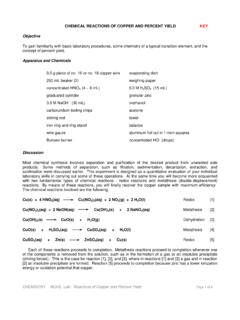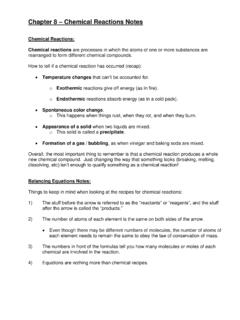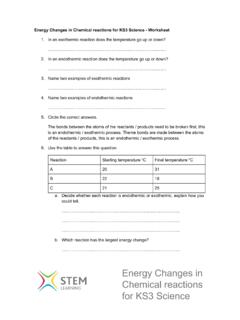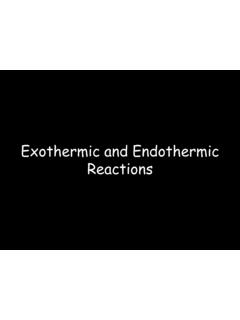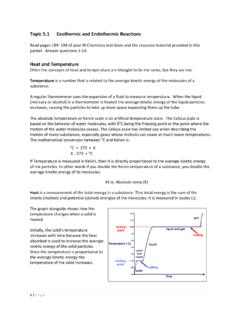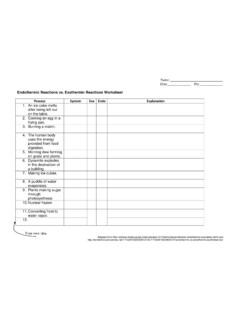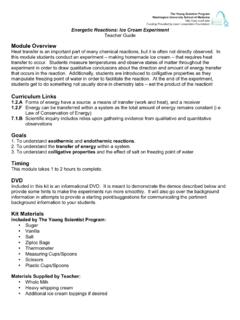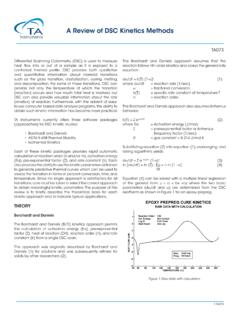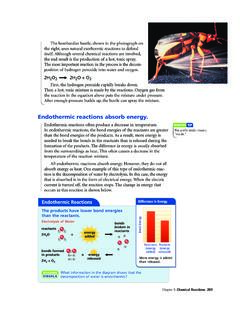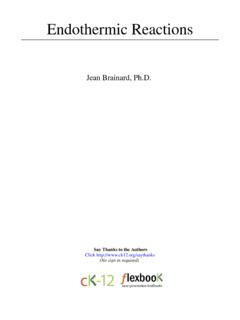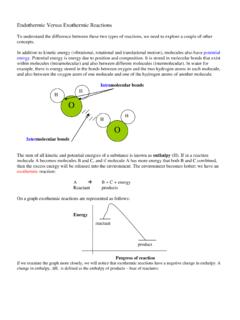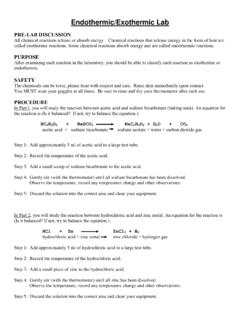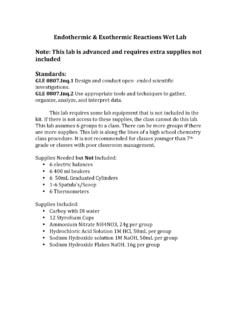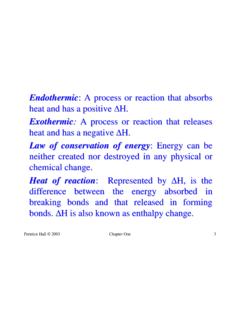Search results with tag "Endothermic reactions"
Name: Honors Chemistry Section: Lab: Endothermic and ...
drvanderveen.comName: Honors Chemistry Section: Lab: Endothermic and Exothermic Reactions Many chemical reactions give off energy. Chemical reactions that release energy are called exothermic reactions. Some chemical reactions absorb energy and are called endothermic reactions. You will study
Chemical Reactions of Copper and Percent Yield
teachnlearnchem.com5. Give criteria in terms of temperature changes for exothermic and endothermic reactions. Exothermic reactions - release heat and feel “hot” to the touch Endothermic reaction - gain heat and feel “cold” to the touch 6. If 1.65 g of Cu(NO 3) 2 are obtained from allowing 0.93 g of Cu to react with excess HNO 3, what is the percent
Chapter 10 – Chemical Reactions Notes
www.sheffieldschools.orgChemical reactions are processes in which the atoms of one or more substances are rearranged to form different chemical compounds. How to tell if a chemical reaction has occurred (recap): Temperature changes that can’t be accounted for. o Exothermic reactions give off energy (as in fire). o Endothermic reactions absorb energy (as in a cold pack).
Energy Changes in Chemical reactions for KS3 Science
www.stem.org.uk3. Name two examples of exothermic reactions Neutralisation & combustion 4. Name two examples of endothermic reactions Photosynthesis & thermal decomposition 5. Circle the correct answers. The bonds between the atoms of the reactants / products need to be broken first, this is an endothermic / exothermic process.
Exothermic and Endothermic Reactions - sd41blogs.ca
sd41blogs.caEndothermic and Exothermic Reactions • Energy must be absorbed to break bonds • Energy is released when bonds form • By comparing the total energy used to break bonds, to the total energy released when bonds form, you can determine what type of chemical reaction has occurred.
Topic 5.1 Exothermic and Endothermic Reactions Heat and ...
www.campbell.k12.ky.usIn endothermic reactions the reactants have a less energy than the products . The difference between these two energy levels is the energy absorbed from the surroundings. It is represented in an energy level diagram as a vertical jump from a lower to a higher level - …
Name Date Per - birdvilleschools.net
www.birdvilleschools.netName _____ Date_____ Per_____ Endothermic Reactions vs. Exothermic Reactions Worksheet . Process System Exo Endo Explanation 1. An ice cube melts after being left out on the table. 2. Cooking an egg in a frying pan. 3. Burning a match.
Module Overview Curriculum Links 1.2.A 1.2
ysp.wustl.eduModule Overview Heat transfer is an important part of many chemical reactions, but it is often not directly observed. In ... To understand exothermic and endothermic reactions.Student handouts covered in large group. To understand the transfer of energy within a system.
AQA, OCR, Edexcel GCSE Science - MME
mathsmadeeasy.co.ukEnergy transfer during exothermic and endothermic reactions Q1: Throughout the course of a chemical reaction, explain what happens to the energy. (1 mark) Q2: During a chemical reaction, if the energy is transferred to the surroundings, how much energy will the products have and why?
A Review of DSC Kinetics Methods - TA Instruments
www.tainstruments.comto both nth order and autocatalyzed exothermic systems. It should be noted, however, that this approach is generally not used to model either endothermic reactions or crystallization kinetics. An nth order reaction will follow equation (1), whereas an autocatalyzed reaction will follow the empirical relationship: dα/dt = k αm (1-α)n (7)
Experiment 9: Enthalpy of Formation of Magnesium Oxide
www.bc.eduAn endothermic reaction is one that absorbs energy and is assigned a positive value. The additive property of ΔH°rxn values will be applied in this experiment in order to determine the enthalpy change associated with the burning of magnesium metal in air. For the combustion of magnesium, reaction (1), one possible set of reactions is:
CALORIMETRY EXPERIMENT A ENTHALPY OF FORMATION OF ...
jan.ucc.nau.eduIf a reaction is exothermic, heat will be released, and the temperature of the system or reaction mixture will rise. (In this experiment the heat and temperature rapidly increase and then slowly decrease as heat is lost to the surroundings.) For endothermic reactions heat will be absorbed or used and the temperature will decrease. In this ...
Diploma in Plastics Technology (DPT)
www.cipet.gov.inirreversible processes - exothermic & endothermic reactions-Types of thermodynamic processes - first law - definition & expression-Heat & work concept with expression. Unit IV - ENGINEERING MATERIALS ( 13½ hours) Engineering Materials: Definition, classification, properties and uses of the following
Endothermic reactions absorb energy. - ClassZone
www.classzone.comEndothermic reactions often produce a decrease in temperature. In endothermic reactions,the bond energies of the reactants are greater than the bond energies of the products.As a result,more energy is
Endothermic Reactions - Whippany Park High School
www.whippanypark.orgIn some chemical reactions, called exothermic reactions, more energy is released when new bonds form in the products than is needed to break bonds in the reactants. The opposite is true of endothermic
Endothermic Versus Exothermic Reactions - Weebly
ghsacceleratedchemistry.weebly.comEndothermic Reactions If substance A must take energy away from the environment in order to form product D, then the reaction is said to be endothermic, and the victimized environment will feel colder after the reaction.
Endothermic/Exothermic Lab - Jayne Heier
jh399.k12.sd.usSome chemical reactions absorb energy and are called endothermic reactions. PURPOSE After examining each reaction in the laboratory, you should be able to classify each reaction as exothermic or
Endothermic,&Exothermic,Reactions,Wet,Lab, Note:,This,lab ...
www.vanderbilt.eduExothermic and endothermic reactions Heat of solution Thermodynamics is the study of energy changes in a system. One important application of thermodynamics in chemistry is the study of heat transfer that accompanies a chemical reaction or a change of …
Endothermic & Exothermic Lab - cpb-ca-c1.wpmucdn.com
cpb-ca-c1.wpmucdn.comExothermic & Endothermic Reactions Lab Purpose: To determine whether a reaction is Endothermic or Exothermic: Hypothesis: If heat is lost to the surroundings and the products contains more energy than the reactants, then the reaction is exothermic. If heat is …
Endothermic: A process or reaction that absorbs H.
alpha.chem.umb.eduPrentice Hall © 2003 Chapter One 4 7.2 Exothermic and Endothermic Reactions When the total strength of the bonds formed in the products is greater than the total ...
Similar queries
Honors Chemistry Section: Lab: Endothermic, Honors Chemistry Section: Lab: Endothermic and Exothermic Reactions, Reactions, Exothermic reactions, Endothermic Reactions, Endothermic, Exothermic, Endothermic and Exothermic Reactions, Name Date Per, Name _____ Date_____ Per, Module Overview, Experiment 9: Enthalpy of Formation of Magnesium Oxide, Endothermic reaction, Reaction, Diploma in Plastics Technology DPT, Endothermic reactions absorb energy, ClassZone, Endothermic Versus Exothermic Reactions, Endothermic/Exothermic Lab, Endothermic: A process or reaction that absorbs

